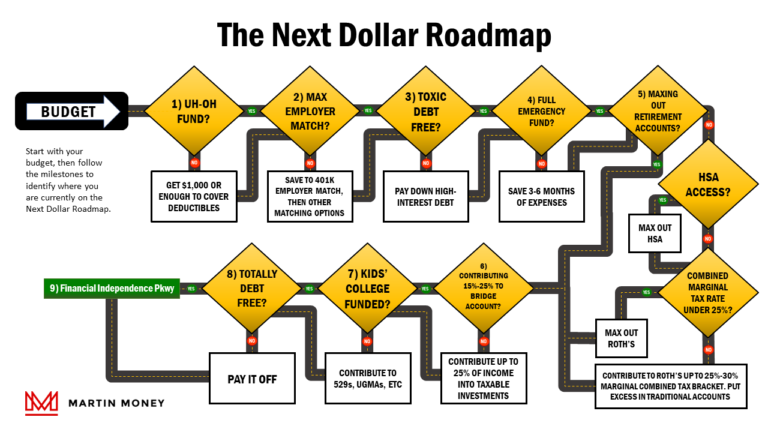Is it a Good Idea to Have a Roth IRA?
Roth IRAs are an excellent planning tool for retirement saving and investing. Their unique tax treatment gives investors an additional level of control over their tax situation in retirement.
I’m a big fan of Roth IRAs.
They are an exceptionally useful tool for optimizing one’s tax obligations in retirement.
Cutting to the chase, I think it’s an exceptionally good idea to have at least some of one’s portfolio invested in an after-tax account.
Here are seven reasons why.
1) Investment Options
The first key advantage of a Roth IRA is the amount of control you have over your investment options.
In 401(k) plans you are limited to whatever investment options are made available to you through your employer.
With an IRA you get to choose your custodian which means you can pick one that offers a broad range of investment options.
This also gives you the flexibility and control to select investments with low costs that could severely impact the growth of your Roth over time.
Finally, a broader selection of investments to choose from makes rebalancing your portfolio easier if you get a little heavy in one asset class over another.
2) Tax Arbitrage
The 2nd reason it’s a good idea to use a Roth IRA is to take advantage of the tax arbitrage opportunities they provide.
As a reminder, Roth IRA contributions are taxed, but withdrawals are made completely tax-free.
That means if you are in a lower income tax bracket when you contribute to a Roth IRA than when you make withdrawals, you can effectively lower your tax liability for the same investments.
For example, let’s say you are in the 12% tax bracket, but you project in retirement you may be in the 22% or even higher tax bracket.
You could fund a Roth IRA now and pay 12% income tax on your contribution now and avoid paying 10% more (in the 22% bracket) when you make your withdrawals.
Of course, this requires a bit of foresight and planning, but if you’re in a low tax bracket odds are you’ll at least be in an equal bracket when you make withdrawals.
3) Tax Limitation
No one knows for sure what the future holds for income taxes in the United States. As we’ll see in a second, there’s a good chance they’ll go up.
A Roth IRA allows you to effectively take that risk off the table now by paying your taxes on contributions.
This is especially relevant considering income taxes are currently scheduled to increase beginning in 2026.
So, going back to our previous example for someone in the 12% tax bracket, that same person will find themselves in the 15% very soon (unless Congress makes some changes between now and then).
That’s a 3% savings for every dollar you contribute. It may not seem like much, but over the lengthy period in which your investments will be growing, it can really add up.
Current tax brackets are 10, 12, 22, 24, 32, 35 & 37 percent. In 2026, they are currently scheduled to increase to 10, 15, 25, 28, 33, 35, and 39.6 percent.
Furthermore, income taxes are about as low as they’ve been in a long time, while our national debt continues to increase.
A future income tax increase seems more likely to me than a decrease, but no one really knows what will happen over time.
4) Tax Diversification
When you begin making withdrawals in retirement, a Roth IRA gives you a place to draw income that isn’t subject to tax.
That means you can stop making withdrawals from tax-deferred accounts when you reach the top of a tax bracket to limit your annual tax liability.
It’s another handy level of control afforded by Roth IRAs that you wouldn’t otherwise have available to you.
5) No RMDs
Another retirement age benefit may be the fact that Roth IRAs do not have required minimum distributions (RMDs).
RMDs are a requirement the IRS places on the owners of tax-deferred accounts to make withdrawals so they can be taxed.
The first withdrawal is around 4% and they only go up from there.
If you don’t actually need that income then this creates an inconvenient and unnecessary tax expense for you.
Well, you won’t have to worry about such a scenario with your Roth IRA. Since withdrawals aren’t taxed, there is no requirement to withdraw from the account at any age.
6) Backup Emergency Fund
Another nice feature of Roth IRAs is the ability to withdraw contributions at any time, tax and penalty free.
So, let’s say you contribute $5,000 to a Roth IRA 4 years in a row. After these contributions were made you run into some emergencies and need the $20,000 you’ve been putting into your Roth IRA.
Since it’s a Roth, you can pull that $20,000 out without owing any taxes or penalties.
The ability to withdraw your contributions gives you a sort of backup emergency fund in case you need cash quickly.
With that said, you should avoid doing this if you can. Once the contributions are removed, they cannot be put back.
That means you’ll miss out on the ability for those contributions to reap years of investment growth which would boost your retirement.
Instead, build up a proper emergency fund with 3-6 months of living expenses to protect your Roth from being raided.
7) Your Heirs Will Thank You
Finally, a Roth IRA is one of the very best types of assets anyone could hope to inherit.
While an inherited Traditional IRA is subject to income taxes and RMDs, Roth IRAs are not taxed even when your heirs withdraw the funds.
Furthermore, they can let the inherited assets sit in the account for up to 10 years after your death, giving them another decade of tax-free growth!
This doesn’t just make them a good asset to inherit, it makes them the very best one on our list.
Some Things to Keep in Mind
While I do admittedly love Roth IRAs, it doesn’t mean they’re always the optimal way to save and invest money.
To begin with, if your income is too high you can’t even contribute to a Roth IRA; at least not directly.
You should also prioritize any available employer-matching contributions through an employer-sponsored retirement plan before contributing to a Roth IRA.
Finally, the Roth vs Traditional decision can be difficult to get just right. Be sure to investigate this in-depth based on your own tax situation before making an assumption that a Roth IRA is the path for you.







